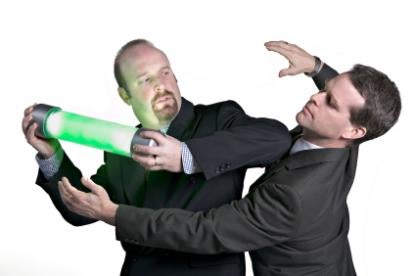On July 5, 2016, the Federal Circuit ruled in Amgen Inc. v. Apotex Inc. that manufacturers of biosimilar products must always give 180 days’ notice before commercially marketing an FDA-approved biologic.
Under the Biologics Price Competition and Innovation Act of 2009 (BPCIA), Apotex has applied with the Food and Drug Administration (FDA) to market a product allegedly “biosimilar” to Amgen’s Neulasta® (pegfilgrastim), which is a recombinant form of granulocyte colony-stimulating factor (G-CSF) approved by the FDA for reducing infection in non-myeloid cancer patients undergoing chemotherapy.
The BPCIA outlines a detailed process, often referred to as the “patent dance,” for the exchange of confidential information and channeling of potential patent disputes between a reference product sponsor and biosimilar applicant. The patent dance begins 20 days after a biosimilar applicant has received notification from the FDA that the application has been accepted for review. The patents identified through the patent dance ultimately can form the basis of two potential phases of litigation. In the first phase, which is governed by paragraph (6) of 42 U.S.C. § 262(l), a subset of patents identified in the patent dance can be asserted against the biosimilar applicant before the FDA grants a license for the biosimilar product. In the second phase, which is governed by paragraph (8) of 42 U.S.C. § 262(l), the reference product sponsor may assert any remaining identified patents after the biosimilar applicant gives notice at least 180 days before commercially marketing its “licensed” product, referred to as the “Notice of Commercial Marketing." The purpose of this provision is to ensure that, starting from when an applicant’s product, uses, and process are fixed by the license, decisions regarding further litigation are not conducted under time pressure that is unfair to the reference product sponsor.
The BPCIA also provides reinforcements and incentives for biosimilar applicants to participate in the patent dance by addressing if and when declaratory judgment actions are available to applicants that either completely bypass or begin, but do not complete, the patent dance.
Shortly before the filing of Amgen v. Apotex, the Federal Circuit held in Amgen v. Sandoz that the patent dance was not mandatory, but that the 180-day Notice of Commercial Marketing was mandatory and must follow, not precede, the licensure of the biosimilar product.
In Amgen v. Apotex, Amgen filed a motion in October 2015 in district court requesting a preliminary injunction requiring Apotex to provide a Notice of Commercial Marketing if and when it received a license, thereby delaying commercial marketing for 180 days from the notice date. In this case, the central legal question was whether the 180-day Notice of Commercial Marketing requirement is mandatory and enforceable by injunction when a biosimilar applicant (here, Apotex) that, unlike Sandoz in Amgen v. Sandoz, participated in the patent dance.
The district court agreed with Amgen and granted a preliminary injunction. The court concluded that the 180-day Notice of Commercial Marketing requirement exists for all FDA-licensed biosimilar products, regardless of whether or not the biosimilar applicant participated in the patent dance.
Apotex appealed the district court’s decision, and the Federal Circuit affirmed the district court, noting that the 180-day Notice of Commercial Marketing is a mandatory requirement enforceable by injunction whether or not the patent dance occurred. Indeed, the Federal Circuit concluded that Apotex’s participation in the patent dance provided only a factual, not legal, distinction between its situation and that of Sandoz in Amgen v. Sandoz. The Federal Circuit also rejected Apotex’s argument that the 180-day Notice of Commercial Marketing would effectively extend the 12 year exclusivity period given to reference product sponsors under the BPCIA by six months, noting that the 12 year date is only the earliest date, not the latest date, on which a biosimilar license can take effect. Specifically, the Court said, “We have been pointed to no reason that the [U.S. Food and Drug Administration] may not issue a license before the 11.5 year mark and deem the license to take effect on the 12-year date.” It is likely, given this important issue that this suggestion by the Federal Circuit will likely be the subject of further litigation, including litigation against the FDA. It will be interesting to see whether or not such a “tentative” license is even feasible and whether or how FDA might issue such a license and the steps brand name companies will take to prevent the FDA from doing so.





 i
i

